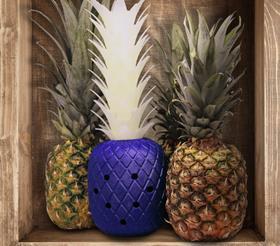
UK-based crop quality specialist Martin Lishman continues to expand its ImpacTrack shock sensing data logger.
The device, which comes in an extensive range of dummy food shapes that replicate the movement characteristics of fruit and vegetables during handling and transportation, is now available for pineapples, following a request from a processing facility in Costa Rica.
The shape,including the leaves of the crown,was created using the very latest in 3D printing techniques and materials toaccurately mimic its real counterpart. Other new additions to the range includesweet potato,Galia melon, and coconut.
“The ImpacTrack sensor is housed in a carrier shell designed to meet specific requirements,” explains Gavin Lishman, managing director of Martin Lishman.
“We can match the size, shape and density of real produce in order to reproduce the movement characteristics of produce prone to damage and bruising during handling and transport,and therefore get as close as possible to a realistic representation of impact ‘black spots’ in handling machinery.”
By recording the journey through handling and packing processes, ImpacTrack users can make modifications to reduce the amount of food wasted because of damage such as bruising. Data from the ImpacTrack is transmitted in real time using Bluetooth to Martin Lishman’s “ML Sensing” smartphone App, making it ideal for on-site analysis of handling equipment.
Operators can also use the App to record the journey of fresh produce during shipping and other transport methods.
The data is downloaded at the end of the journey and provides a record of any impacts sustained. As well as helping to improve transport packaging, this can provide insurers with evidence of where damage has taken place.
“The ImpacTrack gives the user an objective insight into how fresh produce is being handled, highlighting impacts that would be very difficult to see with the naked eye”, adds Gavin Lishman. “The cost savings from some slight machine adjustments can be significant; given that the cost of the unit is relatively low it represents an unrivalled return on investment in this category of quality control”.
Martin Lishman has worked with growers and producers to create more than 32 different ImpacTrack shapes, including eight different apple versions, three avocado sizes, clementines, mangoes and even mussels.
Shapes can be made to a customer’s specific requirements, to ensure that the dummy produce behaves and reacts (including floating in water) in the same way as the real produce being processed and the data recorded is as accurate as possible.
Thanks to Martin Lishman’s experienced in-house design team, new shapes with many different sizes, weights and shapes are constantly being created.
Now in its fourth year of use by the industry, the company said ImpacTrack has become a reliable tool in helping users to adjust their processing and handling lines to significantly reduce spoilage and save in wastage costs.



